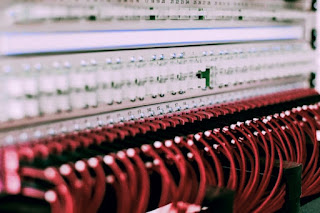Data leakage is a concern for both individuals and companies as it poses a serious security threat, and it occurs when important and sensitive data, such as important emails, text messages, social media posts, etc., is viewed by people who should not have access to it.
 |
| Data analysis - image from Unsplash |
Information leakage can happen in many ways, including hacking or theft, and if you are not careful, your confidential information can be easily compromised.
What is data leakage?
Data leakage happens when people get information they are not supposed to, and this can happen in different ways, whether by mistake or on purpose, and it would be better to be careful with your data because it might get out, and someone might misuse it.
 |
| Protect sensitive business data - image from Unsplash |
For example, imagine you have a credit card, and you use it to buy things online, your credit card number, expiration date and security code are all sensitive information, if this data is released to someone they shouldn't have, they can use your credit card to make purchases from without your knowledge.
Another example is if you are a company, and you have employee records. These records can include Social Security numbers, addresses, and dates of birth, and if this information is disclosed, cybercriminals may use it to commit identity theft or fraud.
Data leakage is a serious problem because it can lead to loss of money, damage to reputation, etc. That is why it is important to be aware of the ways in which it can happen and take steps to prevent it.
How does data leakage happen?
There are several ways in which data leakage can happen, for example hacking, this happens when someone gets unauthorized access to a system or database, and they can do so by using special software or taking advantage of security vulnerabilities.
 |
| The confidential data of the company must be preserved - Image from Unsplash |
Theft: This happens when someone steals data in a physical way, such as a laptop or hard drive. This can happen if you leave your device in a public place or someone breaks into your home or office.
Accidental release: This occurs when data is released unintentionally. For example, you might accidentally send an email to the wrong person or post something publicly that was meant to be private.
Organization Insiders: This occurs when someone who works for a company, such as an employee or contractor, intentionally releases data. They may do so for personal gain or damage to the company's reputation.
Not following security measures: Data leaks can also happen when people don't follow proper security measures. For example, if an employee prints sensitive information and leaves it public, this is a form of data leakage.
System configuration error: This occurs when an individual or the IT department of an organization does not configure the system properly, which can lead to data exposure. For example, if a website's database is not sufficiently protected, hackers can access it.
There are a lot of ways data leaks can happen. As you can see, it is important to be vigilant about your data and take steps to protect it.
What are hackers looking for in the leaked data?
If you are an individual, the attacker's first priority is to get your sensitive data during a data leak. This includes things like credit card numbers, Social Security numbers, and more. Hackers can use this information to commit fraud online through phishing.
 |
| Data analysis - image from Unsplash |
Hackers, other than the above, will look for financial information such as bank account numbers and passwords, and they can use this to transfer money from your account or make unauthorized purchases.
How to prevent data leakage
When it comes to your sensitive data, you must take every measure to prevent it from getting into the wrong hands. So you need to follow some basic precautions.
In the beginning, it is necessary to encrypt your files, as this makes it difficult for hackers to access your data even if they manage to steal it, you should also consider using a data loss prevention (DLP) system, as this software helps prevent leakage of sensitive information, and it can do It does this by monitoring and blocking certain types of data from being transmitted.
If you are a business owner, train your employees on how to handle sensitive information. They must know how to identify what information is sensitive and how to keep it secure.
Employees should know what to do if they think there is a data leak, because it would be better to have a data retention policy, and this would determine how long the employee can keep certain confidential data and how to rotate it without risk.
Finally, to effectively protect your data from theft, you must keep your software up to date, use strong passwords, use multi-factor authentication, use VPN software, be careful what you post online, watch for phishing scams, and finally Monitor your accounts carefully from time to time.
Add Comments